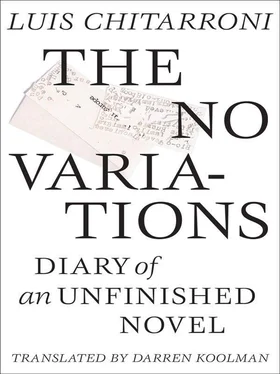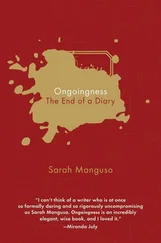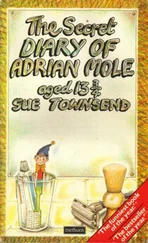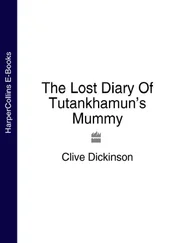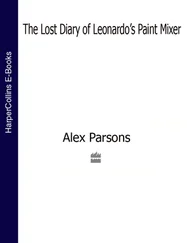Luis Chitarroni
The No Variations: Diary of an Unfinished Novel
“The writer doesn’t really want to write, he wants to be; and in order to truly be, he must face up to the difficult challenge of not writing at all …”
Nicasio Urlihrt, the first name we encounter in The No Variations , and the writer to whom the quotation above is attributed, can never truly be , at least in the legal or corporeal sense, unless, that is, he rearranges the letters of his name and starts calling himself Luis Chitarroni. But Urlihrt is only one among a multitude of fictive entities the author of this so-called diary has created to do his scribbling for him, so that he can face up to the truly difficult challenge of being Luis Chitarroni.
Although largely unknown in the English-speaking world, in South America he’s long been recognized as a prominent editor, literary critic, and author of exceptionally weird books. The first of these, Siluetas (Silhouettes), published in 1992, is a collection of satirical biographies of writers, both real and fictitious, that had previously appeared in the aptly named Argentine literary journal Babel . More ambitious in scope, his 1997 follow-up, El Carapálida (The Paleface), is perhaps the only book he’s yet written that can properly be described as a “novel.” Set in an elementary school in Argentina in the early seventies, it is in fact a pasquinade on the bourgeois pretentions and puerile rivalries among Buenos Aires writers and intellectuals at that time. For his next work, Chitarroni planned to write a hybrid of the preceding two. This “novel” would feature many of the “characters” from Siluetas , portraying them as members of a high-minded literary circle calling itself Agraphia and producing a journal of the same name to which its pompously erudite contributors would be required to submit their stories and poems pseudonymously. Chitarroni would of course be the “sole actual contributor” to this journal, all the pseudonyms being his own, for he wanted to lampoon the literary preciosity and cliqueism he observed first-hand among the self-applauding Argentine literati, and parody their common tendency of concealing a lack of originality beneath a veil of impenetrable difficulty. In order to do this, his “novel” would therefore itself be impenetrably difficult, the difference being that it would mock itself in its own making, laugh at itself, and encourage the reader to laugh along with it.
Of course, this novel was never written. Instead, in 2007, after ten years of planning, Chitarroni presented for publication a book entitled Peripecias del no , subtitled “Diary of an Unfinished Novel”—an omnium gatherum of obscure references, cryptic anagrams, parenthetical remarks, indecipherable aide-mémoire, overblown critical extracts, imperfectly-wrought poems, bewildering drafts of unfinished stories, characters with unpronounceable names … everything, in other words, a reader might expect to find in the diary of an impenetrably difficult unfinished novel, the result being a book that seems to resist all acts of interpretation — be it reading or translating — a book that, according to one Spanish reviewer, reads like a roman à clef that’s been passed through a shredder.
As the translator of these shreddings, I was of course confronted with more difficulties than I’d have space to outline in a preface. The trouble it took to translate the title, for example, certainly augured what I was to encounter on every page of the text. The literal meaning of Peripecias del no is “Peripeties of No,” but while the title works great in Spanish, in English, it is inkhorn. Next, I considered “The Adventures of No,” which was definitely an improvement, but “pulpy” qualities aside, this seemed a little offhand, and didn’t fully capture the several senses of the Spanish word peripecias . So, after deliberating on many other less satisfactory options, everyone concerned finally agreed on “The No Variations”: “variations” is hardly an adequate rendering of peripecias , admittedly, but this did seem the best English language title for what was, in essence, a self-negating book — a book in which stories, poems, snatches of incomplete dialogue, critical extracts, biographical sketches, etc. are variously written and then rejected with a curt and peremptory “NO.” Translating the subheading, “Diary of an Unfinished Novel,” was less troublesome, except that, initially, it made me suspect Chitarroni was playing a kind of literary prank, especially on those readers and critics who love a difficult book. It was as if he were inviting serious readings of what was only a series of haphazard notes for a novel he had neither the time nor talent to complete, and, being unwilling to face up to the loss of time and effort, he’d submitted this aborted embryo for the scrutiny of demented anatomists, cryptographers, and cruciverbalists. This is, of course, decidedly not the case, as the reader will discover, although in an interview with La voz , Chitarroni did candidly and unabashedly admit that Peripecias was “the diary of someone who’s probably lost his ability to ever again write clearly and coherently.” This confession proved more than a little disconcerting to me, as it seemed to require that I ignore the editor inside me and purposely translate the book in the spirit of this diarist.
Besides the difficult prose, the many obscure allusions and references made me seriously consider including annotations on every page. But once I’d translated the first ten pages, I figured that even a partially annotated edition would triple the length of the book. Moreover, since the Spanish edition is bereft of a single merciful gloss for the reader, I was happy to disburden myself of the task, adducing the convenient excuse that readers shouldn’t be deprived of the pleasure of uncovering for themselves the innumerable “buried keys” in the text. After all, readers today are lucky they live in an age when technology allows them to carry a million libraries in their pockets — a million electronic Virgils to guide them out of darkness into light. And, besides, I didn’t want to encroach on Chitarroni’s plans for a possible “sequel” to Peripecias , which he envisions will consist entirely of annotations to Peripecias , then another of annotations to these annotations, and so on, ad infinitum. Of the writing of books there is no end.
Despite frequently availing myself of my electronic Virgil, however, there were other challenges not even an Internet search engine could help me resolve, such as how to translate Chitarroni’s Spanish imitations of great English language writers such as Henry James and Sir Thomas Browne. Of course, Chitarroni wasn’t imitating James or Browne directly, but only their Spanish-language translators. The equivalent task would be if someone were to write an imitation in English of an English translation of Cervantes and submit it to a magazine or journal as an imitation of Cervantes himself. But, being only the English-language translator of Chitarroni, I had the unfortunate task of having, as it were, to back-translate an imitation of a translation — an exercise not unlike something a contributor to Agraphia might attempt. So, in both diction and syntax, I had to find the balance between outright parody and plausible imitation.
The greatest difficulty I faced, however, is one that plagues every literary translator: how to render seemingly untranslatable elements like slang, wordplay, etc. For example, when I asked Chitarroni to explain his use of the name “Falduto,” he said it was supposed to suggest a henpecked man, or a man dominated by women. It is derived from the River Plate slang word pollerudo , but incorporates the more familiar Spanish word falda instead of the colloquial rioplatense term, pollera . Furthermore, “Falduto” was meant to suggest a similar word, falluto , which means a “discreditable, hypocritical man.” After scouring every available lexicon, I finally thought it best to simply keep the original “Falduto” and explain its inclusion here , instead of providing an inadequate rendering of so peculiar a word. In general, though, I always strived to capture in English the various ambiguities of style and substance of the original, and avoid lazily settling on prosaic or banal compromises.
Читать дальше
